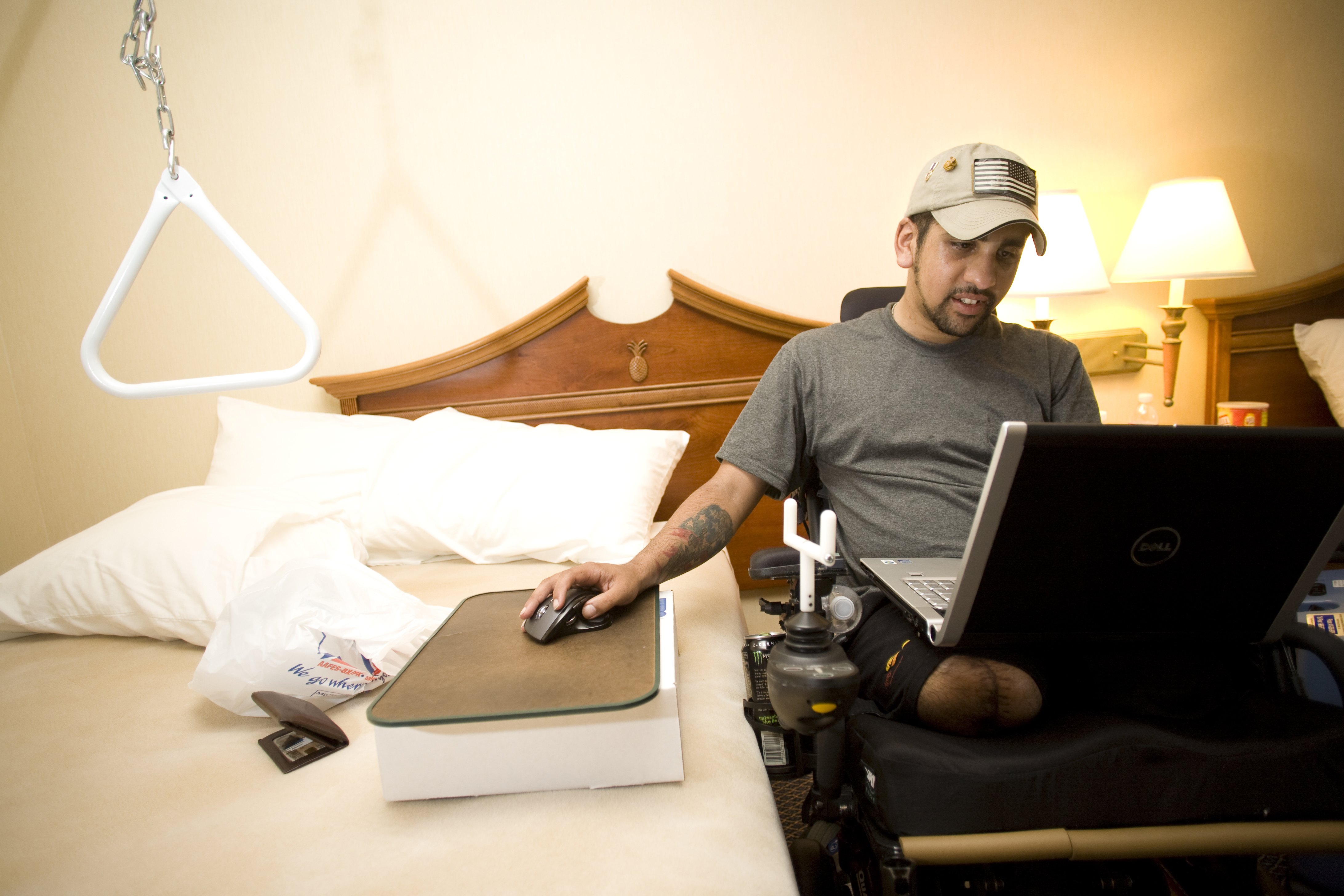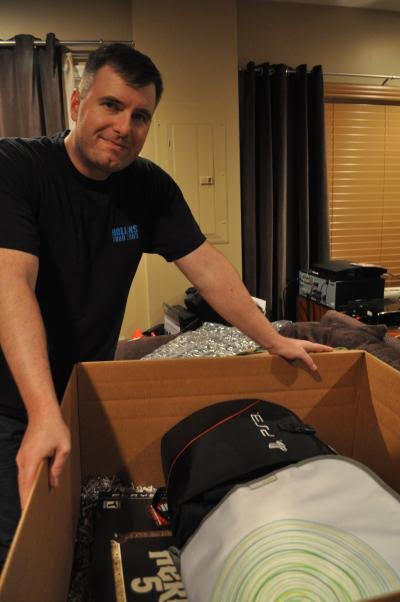
Lately, retired Army specialist Rob Gibson has only two hobbies: video games and researching his own brain. He can dominate a Counter-Strike map and he can explain the hormonal feedback loops of his neuroendocrine system, but that’s about it. He used to love nature — hiking, kayaking, and fishing — but no longer feels safe outdoors. He was a big reader but now struggles to get through even a few pages of his favorite book, Tom Clancy’s Rainbow Six. Two months ago he dropped out of Bellevue University in Nebraska, where he’d been studying cyber security. So now he sits, usually in the dark, alternating between video games and, as he puts it, “obsessively researching this shit.”
Five years have passed since Gibson, 27, completed his final tour in Iraq, where he was a cavalry scout focused on reconnaissance tasks. In the interval between then and this summer he’d been, for the most part, just fine. But while barbecuing with some friends on July 4, he suffered the first of a string of panic attacks that would send his life into a downward spiral. “All of a sudden I had this feeling like I'm not real and the world is not real,” he recalls. “Things just kind of went boom.”
Since then, he’s endured a constant churn of anxiety accompanied by frequent panic attacks, sensitivity to light, night terrors, and the occasional bout of depersonalization (this concept of "not feeling real"). The hardest part, he admits, was not knowing why this was happening.
One month ago, Gibson was diagnosed with post-traumatic stress disorder. To his surprise, the therapist pinpointed a minor car accident in June as the trigger. After the driver fled the scene, Gibson had instinctively entered Army mode, "securing his position" on the side of the road and phoning the cops for backup. It didn’t seem like a big deal at the time, but it was the closest thing to combat he’d experienced since coming back stateside in 2011.
“You never had trauma since then, so your brain just kind of connects the dots and puts you back into Iraq again,” Gibson says his therapist told him. “Your brain decided it's time to deal with this stuff you repressed for all these years.”
There is something about his therapist’s phrasing — the reference to the brain as independent from the self — that resonates with Gibson. While he tends to describe his symptoms in the abstract, he can articulate the architecture of his brain with a detached lucidity. He describes his overactive hypothalamic-pituitary-adrenal axis as if it were a noisy upstairs neighbor, his disrupted neurotransmitters like they’re overworked messengers in an otherwise functional chain of command.
But repairing that architecture is proving difficult. The depression meds make him more depressed; the anxiety pills leave him queasy. Weekly therapy, while helpful, just isn’t enough. At the urging of his Army buddies, he recently applied to some intensive treatment programs but hasn’t heard back from any yet. For now, Gibson has his own method of dulling the symptoms: video games.

“I'D SAY THAT VIDEO GAMES HAVE REALLY BEEN KIND OF THE ONLY SWITCH OFF FOR Me, OTHER THAN SLEEP, OF COURSE — AND THAT'S NOT REALLY DOING TOO GOOD RIGHT NOW.”
“I'd say that video games have really been kind of the only switch off for me “Other than sleep, of course — and that's not really doing too good right now.”
Gibson is partial to the Mass Effect and Fallout series, both of which are set in a post-apocalyptic future. He avoids hyper-realistic games like Battlefield 4 and ARMA 3, though he does enjoy some first-person shooters. He’s especially fond of the online multiplayer mode in Counter-Strike: Global Offensive, which he says is particularly engrossing. “It's kind of nice just because you focus on that other person for like 90 minutes: I'm not Rob with PTSD, I'm that person in the game. I'm very vocal there, calling out which location to go to and stuff like that.”
He recalls a recent mission that he completed with another Army veteran, also suffering from PTSD. “We were bullshitting, and another guy, who was probably like 16, chimed in and was like, ‘How are you guys playing Counter-Strike if you both have PTSD?’ We laughed,” he says. “It’s just different. I know it’s not real.”
Bryant Chambers, a former platoon leader in Iraq in 2003, has given a lot of thought to the ways in which multiplayer gaming can overlap with the experience of combat. On his YouTube channel Alloy Seven, Chambers talks about the feeling of listlessness most soldiers encounter upon coming home, and how that can translate into an emotional numbing — one of the hallmark signs of PTSD.
“The adrenaline rush of being in the fight, knowing that death hangs in the balance, is not something you can recreate outside of combat,” he says in one video. “While I would never claim that Battlefield 3 or games like it can recreate that level of intensity or even come close to it, it still does give you that sense that, ‘Man, this is dangerous.’”

Reached over the phone, Chambers is careful to clarify that the therapeutic value of video games has less to do with their resemblance to war than with the simple act of achieving a challenging task in a group. While his game of choice features a staff sergeant completing missions in modern-day Iraq and Iran, Chambers believes that any type of structured competition, from flag football to Super Mario Brothers, can offer similar benefits to those suffering from PTSD. Still, he has his own theories about why so many veterans seem to find solace in war-related games.
“Video games use a lot of the same operant conditioning that soldiers see. Obviously, soldiers are doing it for real, but with the stimulants and the response that's happening on screen, [the avatar] still behaves very much like a real live human being when they get hit,” he says. “What forges bonds on the battlefield, in a more severe way, is you're with a group of men who you literally depend upon for your life. No video game could ever, ever, ever hope to replicate that, but it could at least give you a taste.”
It’s difficult to say what this taste of combat means, on a clinical level, for veterans with PTSD. While some recent attention has been paid to the positive impacts that first-person shooters can have on the brain, there’s little consensus thus far. Meanwhile, according to Dr. Michael Valdovinos, a clinical psychologist and former Air Force member, the escapism offered by video games can actually be harmful for some veterans.
“When people come back from war, it’s hard to turn off that mechanism,” he says. “We have a very cognitive and behavioral response to gaming, so it can create this reality where you don’t have to address the underlying emotional things that happen when you suffer a trauma. That’s a problem.”
“My first couple of sessions I’d be crying and shaking. I got pretty close to walking away.”
Not that he’s against the use of video games as treatment — just the opposite. Dr. Valdovinos is one of the top clinicians in the field of virtual reality exposure therapy (VRET), a promising psychotherapy that’s already helped thousands of veterans with PTSD. The idea is similar to classic exposure therapy, in which a patient works with a therapist to repeatedly reconstruct a traumatic memory until it becomes manageable. Thanks to recent advances in virtual reality, that reconstruction can now take the form of an immersive, interactive environment that, in many ways, mirrors the experience of playing a first-person shooter.
Virtual reality exposure therapy is almost exclusively conducted through a simulation program called Virtual Iraq/Afghanistan. Developed by Skip Rizzo in the early days of the Iraq war, the simulation originally used graphics of an Iraqi market town recycled from the video game Full Spectrum Warrior. Back then, few in the military believed there’d be any need for such a personalized treatment. “This was still the ‘mission accomplished’ era when people thought PTSD wasn’t going to be a problem in these wars,” Rizzo says, referring to George Bush’s infamous speech delivered from atop the USS Abraham Lincoln in 2003. But as studies emerged citing the high incidence of PTSD among veterans of Iraq and Afghanistan, the military warmed up to Rizzo’s cutting-edge treatment, and eventually began funding it.
For Stephen Cotta, a former combat engineer in Iraq, the virtual experience was both harrowing and life-changing. He entered the VRET program at the University of Central Florida in 2014, after years of untreated PTSD symptoms had left him “approaching rock bottom.” He was haunted by the memory of a grenade hitting his best friend's truck – a killing that Cotta witnessed from just a few yards away. That’s where the clinicians at UCF decided to start.UCF decided to start.
“My first couple of sessions I’d be crying and shaking,” Cotta recalls. “I got pretty close to walking away.” The simulation, customized with details of the agricultural town where the scene occurred, was uncanny. “You’d be able to visually see the landscape while holding a rifle. And they have this little machine that blows out smells of truck exhaust and burning flesh. It completely envelops you.”
After each session, Cotta’s reaction to the traumatic scene became a little less intense. By the time he completed the treatment, the previously traumatic images had lost a lot of their power over him. Along the way, he developed several tools to lessen the impact of his anxiety.
“The end game is that it teaches you that it’s something that’s not going away,” Cotta says. “So what the virtual reality does is it helps you to go back there and cope with it.”
When Steve Machuga pictures the old days, he thinks of a parking lot. It was 2004 and he’d just returned from a 13-month deployment in Iraq. The ex-Army Captain was struggling, terrified to leave the house some days, knowing that each piece of roadside trash would bring back memories of the IEDs he’d dodged overseas. But he also knew that admitting his problems could cost him his job in military intelligence.
“I just remember sitting in the parking lot of the medical facility and crying. I didn't want to risk not doing anything, but I also didn't want to ruin my career.”
Instead, Machuga turned his attention to World of Warcraft community. He learned from his time overseas that gaming could serve as a useful distraction, but was surprised to find that WoW actually helped him leave the house. “I remember thinking, OK it’s trash day, but I have to go out and grab something before the five-man raid,” he says. “It was like a mantra, a little thing that I could put in my head and focus on that allowed me to go out.”

“I managed to avoid a lot of the problems that guys get into when they get home, like drugs, alcohol, prescription medication, all that stuff, because I had something to calm my brain.”
Looking back, Machuga credits video games with saving his life, or at least keeping it from spinning out of control. “I managed to avoid a lot of the problems that guys get into when they get home, like drugs, alcohol, prescription medication, all that stuff, because I had something to calm my brain.”
These days, Machuga is devoted to providing others with the same recreation he found so useful. For the past year, Machuga has run a non-profit called Stack-Up.org, which sends video game care packages to soldiers both home and abroad. The two most requested games, he notes, are Call of Duty and Battlefield. The organization also has an “air assault” division to send disabled vets to gaming conventions and several local Stack programs that encourage vets and civilians to volunteer together.
All of these initiatives are based on the idea that, rather than being a solitary pursuit, video games can breed interpersonal connections, both face-to-face and through the screen. Machuga notes that today’s gaming landscape bears little resemblance to the anti-social, basement-dwelling caricatures of the past. A better comparison might be a global arcade, one filled with an increasingly large group of like-minded people.
“Back when we deployed [in 2003], gaming was still a thing for nerds and dorks to do,” says Nate Serefine, a Stack-Up co-founder and Machuga’s ex-Army buddy. “Now everyone's into video games. It's kind of great.”
The mainstreaming of video games as a social activity may be especially relevant to the 2.5 million Americans who served in Iraq and Afghanistan. A poll taken this summer found that more than half of these veterans believe the government is not doing a good job in addressing the requirements of the current generation of vets. And according to one recent study, many combat soldiers with PTSD are now experiencing a unique form of loneliness — labeled experiential loneliness — stemming from the isolation they feel upon returning home.
“Going back generations, there's always been non-governmental organizations that have tried to fill that gap, especially in a social space, like the VFW halls or the American Legion,” says Serefine. “They provided a safe place to hang out where you don't feel like you're being judged and you could just talk to other people that have been through similar experiences. What we're doing is kind of along that line of thinking, only it's more virtual and not as localized. We think it’s better catered to this generation of veterans.”
Some time after speaking to Complex, Rob Gibson was finally admitted to a treatment program for his PTSD. Two days after Christmas, he'll leave Nebraska for Topeka, Kansas, where he’ll spend seven weeks at an inpatient program for veterans. The program is intensive, with daily activities ranging from Tai Chai to prolonged exposure therapy. If Gibson is nervous, he doesn’t let on.
“I’ve done tons of research on what works and what doesn't,” he tells me. “Everyone says this is the best way to do it. Go head first, just face your fears.” He plans on bringing a laptop and a few games — old standbys like Skyrim and, ironically, Shellshock — but knows he’ll be mostly focused on the program.
There is another thing on Gibson’s mind now — a comment that Donald Trump made back in October, implying that those suffering from PTSD weren’t strong. It’s a thought that, at one point or another, has haunted every veteran I speak with. Even for someone like Gibson, a self-taught expert on the physiological causes of his symptoms, it can be hard to ignore the longheld perception that seeking help is a form of weakness.
“Back when I was in, people didn't talk about it,” he says. “You didn't get mental health support because that was just something that you didn't need. You were a soldier.” Gibson left the Army five years ago, but notes that little has changed in the ways we think and talk about invisible battle wounds. So while the emergence of supportive gaming communities and innovative virtual treatments is encouraging, neither development is particularly meaningful so long as the historical foundation of the stigma remains.
Just before he hangs up, Rob Gibson offers a parting thought, a rare bit of self-analysis not related to the mechanisms of his brain. “I don't think it's bad to reach out for help,” he says. “I think it's probably the most important thing I've ever done in my life.

